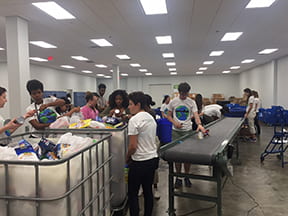Written by Vineet Raman, undergraduate in biology, Latin American & Caribbean studies and Spanish at University of Georgia and participant in the Institute for Public Health Summer Research Program
After learning about a multitude of contemporary public health topics from experts all over the Institute for Public Health, it was time for all of us to engage directly with an issue that 17.5% of the St. Louis metro area (including 173,000 children) face daily food insecurity.

Last Thursday, we fled the blistering St. Louis summer into the cool, modern, 67,000 square foot facility of Operation Food Search. Operation Food Search is the largest distributor of free food in the Missouri-Illinois region, reaching 190,000 people every month. Katie Schneider, Operation Food Search’s volunteer manager, walked us through the huge facility.

It was interesting to think about the role of organizations like Operation Food Search in the context of my research project. With Dr. Amy McQueen, I am studying the relationship between unmet basic needs (food, shelter, transportation, etc.) and diabetes measures among low-income individuals. Several of our study’s participants utilize food pantries as their main source of nutrition. They also receive counseling on how to shop for and prepare healthier meals on a budget.
For the service component of our visit, we processed canned and boxed foods and prepared them for distribution. It was exciting to see everyone up and about and working together as a team. Two hours, two conveyor belts, and one broken jar of jelly later, we had gone through hundreds of cans and packed dozens of boxes ready to be distributed throughout the community.
Our time at Operation Food Search was short, but it undoubtedly gave us the opportunity to engage with a global issue. As we continue our projects and think forward into our careers, we should always stop to acknowledge that some of the greatest public health crises may, in fact, be taking place in our backyards.

